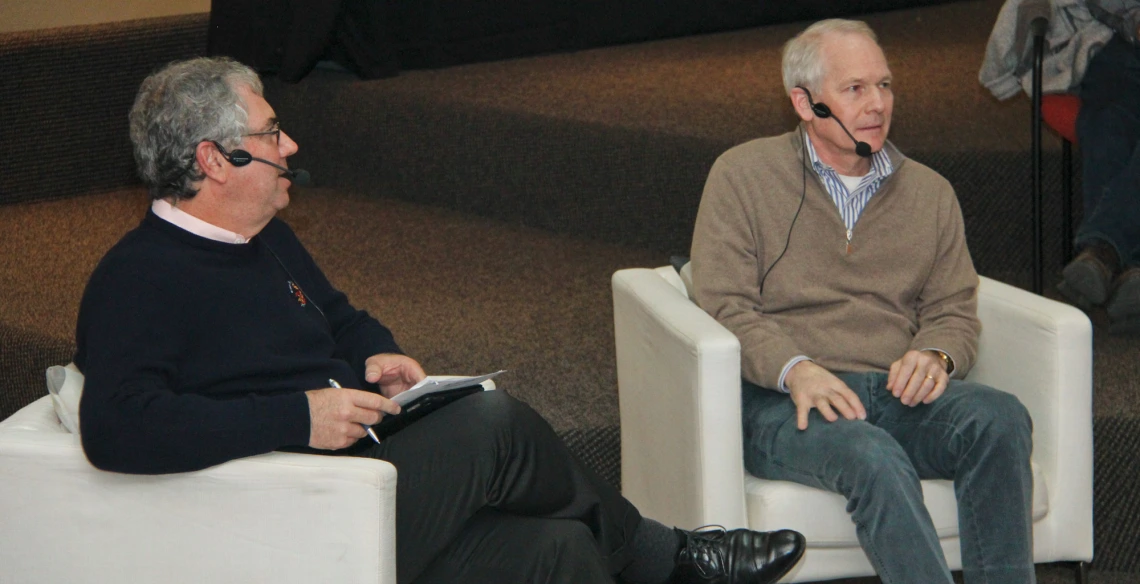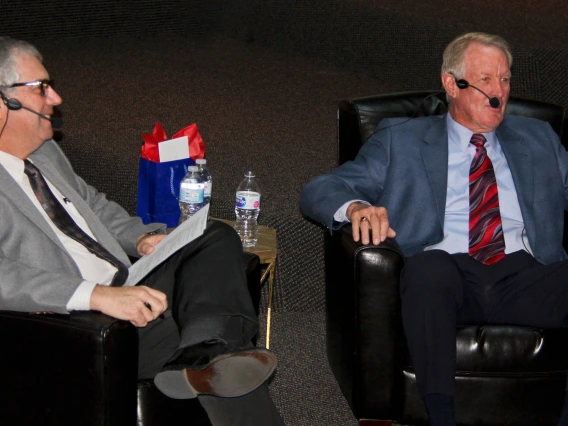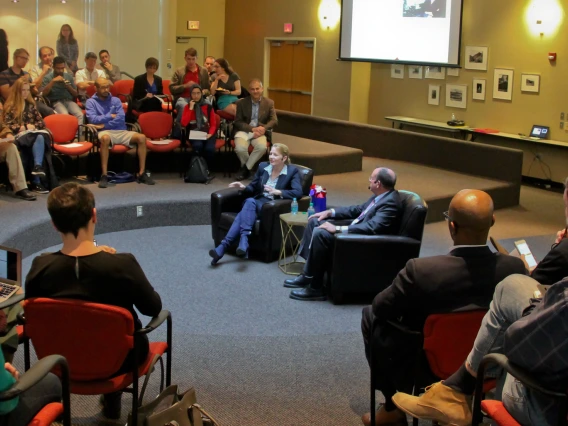Students Get Rare Look Into Microsoft Exec's MO
Longtime leader shares with UA Engineering students his secrets for success, predictions for emerging technologies, and tips for effective management and leadership.

Microsoft's chief digital officer Kurt DelBene, right, and College of Engineering Dean Jeff Goldberg discuss executive leadership with the audience at the inaugural talk in the College of Engineering speaker series, Lessons in Engineering Leadership.
You could hear a pin drop as Kurt DelBene took University of Arizona Engineering students behind the scenes at Microsoft and on a journey to discover what it takes to lead in a world growing more technologically complex every day.
Software industry leaders must stay engaged in the intricacies and trends of engineering, he advised students, “deep in the weeds,” while never losing sight of the bottom line.
“You really have to keep your hands on everything -- from a business perspective,” said DelBene, Microsoft’s chief digital officer and executive vice president for corporate strategy, core services engineering and operations.
At the Jan. 29 in-the-round campus conversation with College of Engineering Dean Jeff Goldberg and about 80 students, DelBene recalled developing and revamping early versions of Microsoft Windows and Outlook and transforming Microsoft Office from a desktop application to a cloud-based service.
His candid words and easygoing manner belied DelBene’s stature as one of the most influential leaders in the software industry. As former president of the Microsoft Office Division, he led an enterprise generating $25 billion in annual profits -- with the expectation that he’d increase growth by 10 percent every year.
The stress can get intense, said the 58-year-old, who races vintage cars to relax.
Software Pioneer
In the kickoff lecture for the College of Engineering’s speaker series, Lessons in Engineering Leadership, DelBene -- who has a BS in industrial engineering from the UA, MS in operations research from Stanford University and an MBA from the University of Chicago -- encouraged students to ask tough questions, challenge what they deem misguided projects or plans, and advocate strongly for their own technical, business and career positions.
“There are certain times in your career when things are not going in the direction you want, and you have to give others a little nudge,” he said. “You have to be able to say, ‘Hey, I think we need to do things differently.’”
You’re set up to fail when you have folks who have never built a website but have the hubris to think they can.”
The first time he was promoted to corporate vice president at Microsoft, DelBene was charged with preparing for reintroduction a glitchy application called Outlook.
“I still remember when a senior vice president said, ‘I think you need to wait another year.’ I said, ‘No, I don’t think that’s right,” DelBene recalled. “It was really painful.”
Years later his well-known fix-it philosophy and reputation for getting the job done trumped a lack of healthcare experience when DelBene left Microsoft in Redmond, Washington, in 2013 to fix the Healthcare.gov website at the request of President Barack Obama.
Healthcare.gov crashed because IT people thought they could design it, DelBene explained.
“You’re set up to fail when you have folks who have never built a website but have the hubris to think they can.”
The team was trying to rush improvements in months that would take years to be done right.
“People didn’t challenge the plan and ask the developers about going a different way,” he said. "I came and said, ‘Technically, it’s impossible to do what you’re asking.’”
Code for Success
DelBene returned from Washington, D.C., and rejoined Microsoft in 2015. Today he oversees 5,000 employees advancing longtime top-sellers and new Microsoft products like the Azure cloud-computing platform and Microsoft Graph.
Asked by a student what he wished he had known when he first entered the industry, DelBene answered, “The importance of building consensus.”
“Today, I bring all stakeholders working on a project into a room once a month. After we walk through the issues, I ask, ‘Are we all on the same page? Is there anything else anyone has to offer?’”
DelBene recommended several management and leadership strategies:
- Beyond effectively allocating employee resources, enable employees to excel.
- When deciding on promotions, consider how employees have contributed to the success of others and their team.
- Base promotions on merit and skill to place employees in the right positions for solving particular problems.
- Embrace diversity and inclusion.
- Get people to trust your instincts.
Technology Predictions
Many of the UA students sought DelBene’s opinions on emerging technologies. He’s bullish on artificial intelligence.
“AI is going to permeate everything we do,” he said, predicting it will improve lives in countless ways: make administrative workers’ jobs less menial and more meaningful, give corporations and agencies real-time access to expertise worldwide, and even help college students craft better résumés.
DelBene is dubious about the digital currency bitcoin but optimistic about the blockchain platform for recording transactions in cryptocurrency, which uses encryption for verification and transfer of digital funds. He also predicts a future for self-driving cars and all big data in the cloud.
He’s particularly excited about biomedical software for catching cancer “from the very first cell” and developing and delivering more highly targeted and effective cancer therapies.
“You’re going into a great field!” he told students.
Register now for the Monday, Feb. 26, 2018, Lessons in Engineering Leadership talk with Dave Crawford.
The retired CEO and president of Sundt Construction knows what it is like to turn an industry on its head, and make business better for it. He was instrumental in getting legislation passed allowing multiple companies to bid on and deliver construction projects jointly -- a radical departure from the days when firms specializing in different areas managed each phase of a project separately.
Join Crawford -- BS 1972 civil engineering -- as he guides students through the challenges of bringing together and working with disparate teams on multifaceted projects.
Registration is also open for an evening discussion with Laura McGill, vice president of engineering at Raytheon Missile Systems, who will deliver the third talk in the Lessons in Engineering Leadership series on Wednesday, March 28, 2018.



